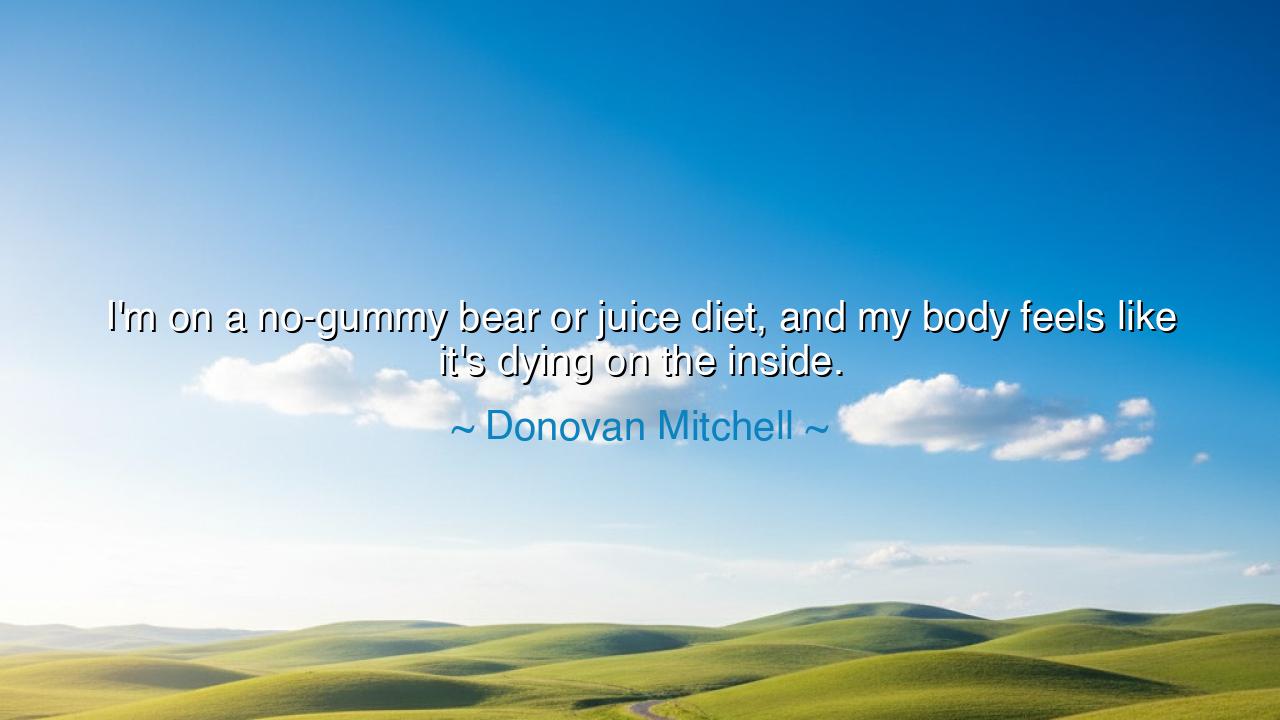
I'm on a no-gummy bear or juice diet, and my body feels like it's






The words of Donovan Mitchell—“I’m on a no-gummy bear or juice diet, and my body feels like it’s dying on the inside”—may, at first glance, sound humorous, even lighthearted. Yet beneath this jest lies a truth as ancient as discipline itself: that the path of restraint is never easy, and that the body often protests what the soul requires for its growth. Mitchell, a man known for his athletic power and precision, speaks here not merely of sugar and sweetness, but of the deeper struggle between desire and discipline, between comfort and sacrifice. His words echo through the ages as a reminder that all who strive toward greatness must endure the pain of denial before they taste the joy of victory.
In these words, gummy bears and juice become symbols—small delights that represent all the comforts we cling to, all the temptations that whisper to us when the path of excellence demands otherwise. To forgo them is to deny not only appetite, but ease itself. And so when Mitchell says that his body feels “like it’s dying on the inside,” he speaks the truth of every person who has chosen discipline over indulgence. For the body, accustomed to pleasure, mourns its loss; yet the spirit, though weary, begins to rise. It is in this very tension—between the dying of comfort and the birth of will—that greatness is forged.
This teaching is as old as the mountains. The ancient Spartans, whose lives were stripped of luxury, understood this principle well. From youth, they were trained to embrace hardship, to eat little, to sleep on reeds, and to endure pain without complaint. What to others seemed suffering, to them became strength. They knew that the sweetness of indulgence weakens the warrior’s heart, while the bitterness of discipline purifies it. In Mitchell’s modern lament, we hear the echo of that same truth: that the path to mastery demands sacrifice—not only of pleasure, but of comfort, complacency, and ease.
Yet his words are not merely about the pain of denial—they are about humility and humor, the two shields that guard the disciplined soul. By laughing at his own struggle, Mitchell reveals the wisdom of balance: that even amidst self-control, one must retain lightness. The ancients called this ataraxia—the calm that comes when one accepts hardship without resentment. To laugh at one’s suffering is to rob it of its sting; to acknowledge one’s weakness is the first act of strength. Thus, in jest, he speaks as a philosopher might: discipline is suffering, but it is suffering worth embracing.
The origin of this struggle is universal. Every artist, athlete, scholar, and seeker has faced the same moment—the moment when the joy of indulgence must be cast aside for the promise of a greater good. Michelangelo, while painting the Sistine Chapel, often went without sleep and food, his neck stiff and body aching, yet he pressed on, for the vision within him demanded more than comfort could provide. His body, too, must have felt as though it were dying, but through that death came immortality. The same is true for Mitchell, and for all who dedicate themselves to purpose.
This quote, then, stands as a parable of sacrifice. It teaches that the pursuit of excellence is not a gentle road. To grow stronger, one must first suffer the withdrawal of weakness; to live fully, one must allow parts of the self to “die”—the parts that crave ease, distraction, and sweetness without effort. When Mitchell speaks of his body dying, he unknowingly describes a sacred transformation—the kind the ancients called metanoia, a change of heart and spirit brought forth by perseverance. The death of comfort gives birth to discipline, and discipline gives birth to destiny.
Let this be the lesson carried forward: do not fear the death of ease, for it is the price of greatness. When your body or your mind cries out for rest or indulgence, remember that such cries are but the echoes of the old self fading away. Endure them with humor, as Mitchell did, for laughter is the balm of the disciplined soul. In every denial, there is renewal; in every sacrifice, a seed of triumph.
So heed the wisdom hidden in Donovan Mitchell’s jest. Whether you strive for strength, art, or virtue, know that discipline will often feel like dying—but it is the death that gives birth to life. The sweetness you surrender today will return a thousandfold in glory tomorrow. For in the end, it is not the man who lives for comfort who endures, but the one who endures discomfort who truly lives.






AAdministratorAdministrator
Welcome, honored guests. Please leave a comment, we will respond soon